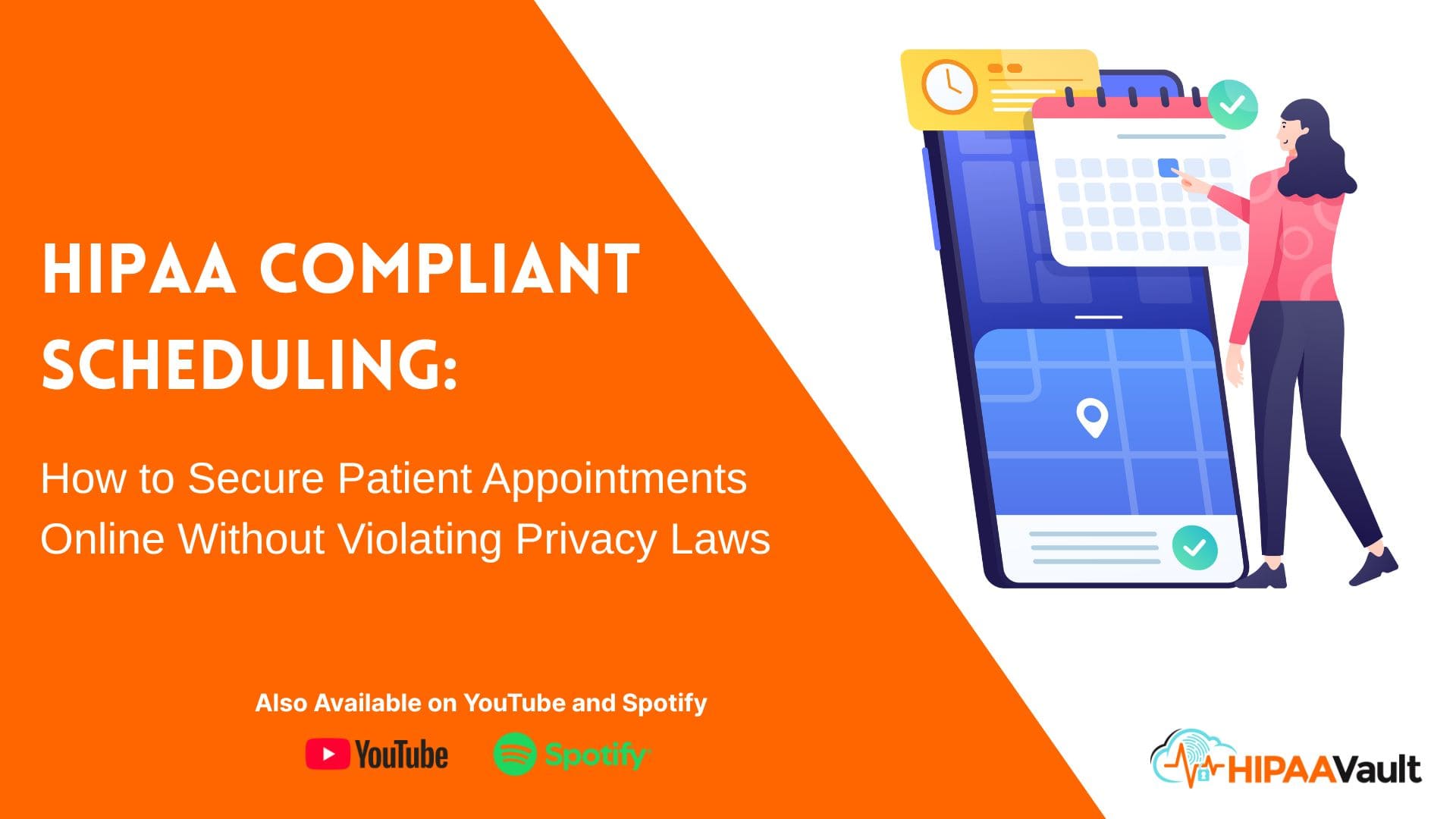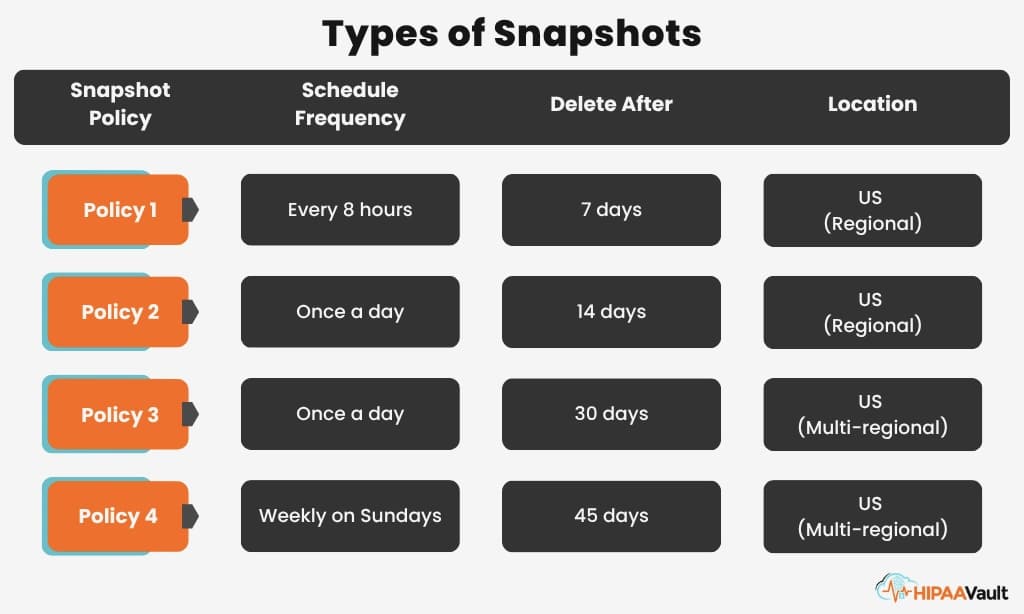Why HIPAA-Compliant Scheduling Is No Longer Optional
In today’s digital healthcare environment, HIPAA compliant scheduling isn’t a luxury — it’s a necessity. 🧠
Medical and therapy practices are under increasing pressure to streamline operations, enhance patient experiences, and remain compliant with strict privacy laws. One of the most overlooked components of this transformation is online scheduling — and the potential HIPAA violations that come with it.
🗣️ “HIPAA compliance isn’t just about software. It’s about understanding where your data flows — and protecting it at every step.”
– Adam Zeineddine, Co-Host, HIPAA Insider Show (HIPAA Vault)
Watch the full episode on YouTube:
👉 Need help assessing your current scheduling system? Book a FREE HIPAA site audit
What Is PHI and Why It Matters in Online Scheduling
When a patient uses an online form to book a healthcare appointment, they usually provide:
- Full name
- Phone number
- Email address
- Date of birth
- Reason for the visit
- Medical history or symptoms
This quickly turns PII into PHI — Protected Health Information, which falls under HIPAA jurisdiction.
🗣️ “Once you bolt on that [medical] part, now you’ve converted it from just PII to PHI — protected health information.”
– Gil Vidals, CTO & Founder, HIPAA Vault
🗣️ “We’re dealing with electronic patient medical data here. It’s critical that we treat it as sensitive from the start.”
– Gil Vidals
HIPAA vs PII vs PCI: Understanding the Differences
PII = Name, email, SSN
PHI = PII + Medical details
PCI = Credit card or payment information
Most scheduling platforms handle all three — which means compliance is non-negotiable.
Core Security Requirements for Online Scheduling Tools
To meet HIPAA standards, scheduling tools must include:
- End-to-end encryption (in transit + at rest)
- Access controls (role-based permissions)
- Audit logs (track who accessed what, when)
- Two-Factor Authentication (2FA)
- Data minimization
🗣️ “Encryption is always top of mind — you need it both in transit and at rest.”
– Gil Vidals
🗣️ “Access controls, audit trails, and knowing who touched what — these aren’t just best practices, they’re essential.”
– Gil Vidals
Customize Your HIPAA Bundle—Pick 3 and Save 15%
Don't pay for tools you don't use. Combine Hosting, Email, Fax, or Text into one affordable, managed plan.
Learn MoreBusiness Associate Agreements (BAAs): Why You MUST Have Them
If your software provider stores or transmits PHI, you legally need a signed BAA.
🗣️ “Even if a business associate is not necessarily looking at the data… if it’s just flowing through their system, that still requires a BAA.”
– Gil Vidals
Always ask your vendor:
“Do you provide a HIPAA-compliant BAA?”
If the answer is no — walk away.
Integrating HIPAA Scheduling with WordPress
WordPress is flexible but not automatically compliant.
🗣️ “Just because you have an alarm system doesn’t mean the house is secure — someone still has to close the windows. WordPress is like that.”
– Gil Vidals
Tips:
- Enable 2FA (Authy or Google Authenticator)
- Use secure plugins (JotForm, Simply Schedule)
- Install security tools (WordFence, iThemes Security)
- Keep WordPress core + plugins updated
🗣️ “It’s up to the business owner to drive the security — most developers won’t turn everything on unless asked.”
– Gil Vidals
Role of Hosting Providers in HIPAA Compliance
Hosting providers must offer:
- A signed BAA
- Encrypted cloud infrastructure
- Audit logging + access tracking
- Staff security training (on your end)
🗣️ “The cloud providers handle the physical security. But training your staff? Locking their keyboards? That’s on you as the business owner.”
– Gil Vidals
Free vs Paid Plugins: The Hidden Risks
🗣️ “Free plugins are usually one version behind — and that’s where the vulnerabilities come in.”
– Gil Vidals
🗣️ “If you’re going to be in this business of patient data, you really need to pay for the tools that keep it secure.”
– Gil Vidals
Paying ensures:
- Ongoing updates
- Dedicated support
- Legal coverage in case of a breach
Training Staff for HIPAA-Protected Data Handling
Don’t ignore the human factor.
- Train your team on HIPAA rules
- Enforce screen locking
- Limit access with user roles
- Require certifications annually
Key Takeaways
- PHI = High risk + high responsibility
- HIPAA compliance is a shared duty
- WordPress can be secure, but only when configured properly
- Don’t trust “free” tools with sensitive patient data
- Always sign a BAA with any vendor touching PHI
Frequently Asked Questions (FAQs)
Final Words
Watch the full episode on YouTube:
🎥 HIPAA Online Scheduling & PHI: What You Need to Know
🗣️ “Don’t be shy to reach out to us. We’re happy to meet, review things, and give you pointers. No pressure, just help.”
– Gil Vidals
🗣️ “One of our listeners called and said, ‘Wait—are you Adam from the video?’ That kind of connection is exactly what we’re about.”
– Adam Zeineddine
Need a HIPAA-compliant scheduling tool or website audit?
👉 Visit hipaavault.com or Book a Free Call








